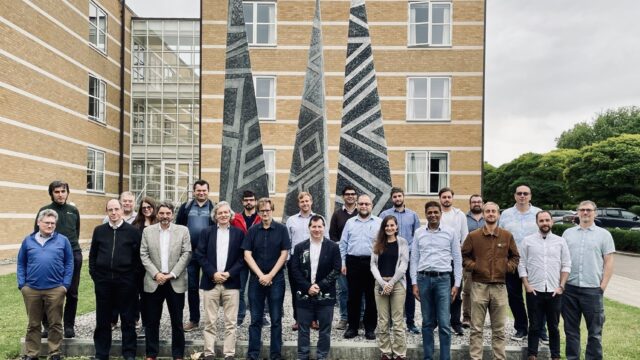
The Rise of Dawn
How the UK’s fastest AI supercomputer is supporting goals in clean energy, personalised medicine and climate.
Our mission is to make zettascale possible, exascale practical.
The Cambridge Open Zettascale Lab is dedicated to making exascale practical while facilitating innovation in emerging zettascale technologies.
Formed in collaboration with the University of Cambridge, Pembroke College, Intel and Dell Technologies, the Zettascale Lab enables technology leaders and experts from around the world to explore, test and advance the next generation of high performance computers.
As of November 1 2023, Cambridge Open Zettascale Lab is home to the UK’s fastest artificial intelligence supercomputer – Dawn. Built by the University of Cambridge’s COZL and Research Computing Services, Intel and Dell Technologies, Dawn was announced by the UK government on 1 November 2023 to coincide with the AI Safety Summit, led by Prime Minister Rishi Sunak.
Read the full press release here ->
Discover more about the Dawn service by clicking the logo below ->


Zettascale refers to the next generation of supercomputers.
Zettascale systems will combine high performance computing for simulation and artificial intelligence training with ultra-fast data storage and analytics.
These capabilities will allow scientists, engineers and clinicians to perform the advanced research and development necessary to begin solving the world’s critical problems.
With zettascale-class systems, we can better understand the nature of the universe, design new materials and clean energy solutions, as well as develop and deliver personalised medicine and data-driven healthcare.
exabytes of data will be created each day by 2025
of the overall HPC market is supercomputers
exascale computing systems will come online in 2025
it is predicted that the first zettascale system will be assembled in 2035

How the UK’s fastest AI supercomputer is supporting goals in clean energy, personalised medicine and climate.

Cambridge Open Zettascale Lab now recruiting!

Dawn enters the Top500.

oneAPI OpenMP at Cambridge.

The Cambridge Open Zettascale Lab is hosting Dawn, the UK’s fastest artificial intelligence (AI) supercomputer, which has been built by the University of Cambridge's Research Computing Services, Intel and Dell Technologies.

An introduction to High Performance Computing (HPC) and Artificial Intelligence (AI).

Cambridge Open Zettascale Lab researchers lay the foundation for future computing ecosystems with Intel® oneAPI Tools.

Thanks to everyone who participated in the ExCALIBUR International Extreme Data programme.

Dell's Accelerated Understanding microsite hosts the Research Computing Services, Intel and Dell Technologies film series on innovations in data centre technology.
Five key themes define the initial focus of the Cambridge Open Zettascale Lab. A regular series of projects, publications and technical resources will evidence the progress of these themes, and more themes will be elaborated as the Lab matures.
The Cambridge Open Zettascale Lab is undertaking advanced research to improve the efficiency of contemporary high performance computing.
Ethernet is ubiquitous in the enterprise space but is only now showing promise in terms of its latency performance in an high performance computing environment.
oneAPI is a new scalable programming model from Intel that targets heterogenous systems, easing the task of programming for and running code on different computer architectures.
Scientific OpenStack® creates a very powerful and flexible environment to manage and use large-scale high performance systems.
Storage for zettascale systems is an area of significant challenge. The explosion in the production and use of data in science, engineering, medicine and industry has led to performance bottlenecks and system slowdowns as traditional high performance computing storage architectures fail to keep up with the increasingly important role that analysis plays in supercomputing workflows.

Learn the fundamentals of programming in a heterogeneous environment.

Learn the fundamentals of programming in a heterogeneous environment.

This two-part workshop will focus on the use of DPC++/OpenMP for offloading on to GPUs.
The latest talks, workshops and training events from the Cambridge Open Zettascale Lab.